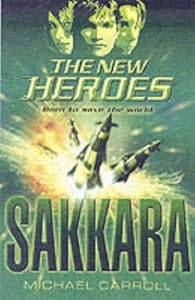 Image via Wikipedia
Image via WikipediaBy coincidence, my final post of 2011 happens to be my 50th post overall. There's something special about both the end of the year and milestones. They convey a sense of accomplishment or perhaps survival ("Hey, we've made it this far!")
Both also provide an opportunity to take stock of where to go from here.
For me, I hope to launch into 2012 in a big way: by querying a literary agent.
I know, I know . . . there have been many discussions about whether agents are even necessary in the modern age of do-it-yourself publishing, and a lot of good arguments have been made for going it alone (that is, cutting out both middle men: the agent and the publisher). Self-publishing remains a viable option for most writers, but, for various reasons, the next logical step for me is to seek representation. (Perhaps in a future post I'll detail those reasons.)
Assuming you're like me and want the best deal you can possibly get for the book you've labored so hard to create, one option to explore is finding a literary agent through AgentQuery.
(And a nod to Dave Whitaker at Writ by Whit for introducing me to AgentQuery.)
AgentQuery is a powerful search tool that lets you search for agents through keywords (the name of an agent, for example, or a book title) or through genre (fiction or nonfiction). If you're as clueless about finding an agent as I am, the genre search is your best bet. It helps you search for agents who represent anything from science fiction to chick lit, from graphic novels to erotica, from children's books to commercial fiction. AQ then provides you with the tools to narrow down your search.
Here are five shortcuts for navigating your way around AQ:
1. Determine your book’s genre. Many writers dislike the idea of "pidgeonholing" their books by genre, yet selecting the right genre can greatly reduce your search for an agent. You may have written the most compelling vampire/steampunk/historical romance/thriller there is, but agents like to categorize things more narrowly (so, coincidentally, do publishers). Decide which of those genres best represents your book and search according. (Tip: If searching for one genre does not yield appropriate results, switch to one of the other genres.)
Sometimes, though, determining your book's genre can present challenges. My novel, THE POWER CLUB™, is a super-hero story, for example, and I tend to think of super-heroes as its own genre. (Guess what? AQ does not list "super-heroes" under its genre search.) However, many agents, publishers, and readers tend to classify super-heroes as science fiction or fantasy. This is useful to know since some agents state up front that they do not handle these genres. It does no good to send an agent something she does not represent.
Fortunately for me, THE POWER CLUB™ also fits into another type of genre: young readers, specifically those aged 10 and up. This classifies it as either Middle Grade (ages 8-12) or Young Adult (12 and up). Also on my side: most agents who handle MG or YA handle both, so that means I can get by with doing just one search.
2. Search for agents who represent books in your genre. A search for "Middle Grade" turned up more than ten pages of agent listings!
This seems like a lot, but each blurb tells you immediately whether or not the agent accepts unsolicited queries. Since your query will be unsolicited (unless you already know the agent, in which case this entire search is superfluous), you may safely bypass any agent who does not take unsolicited queries.
If the agent does accept queries, click on the Full Profile link for the next step:
3. Pay attention to each agent’s likes and dislikes. Most profiles give very specific criteria for what the agent represents, does not represent, or has a special interest in. Criteria can be anything from seeking out particular types of authors (e.g., Latinos or experts in certain fields) to specific sub-genres ("no mysteries or thrillers"). Do some hard soul-searching. If your book falls into an agent's "dislikes," move on.
4. Research titles and clients the agent has represented. One of AQ's most useful features is that it provides space for agents to list new deals and past and present clients. Most of these entries contain pitch-like summaries of books the agent has sold to publishers.
Why is this valuable to you? If an agent has sold a book like yours, she probably knows how to sell yours. Also, agents are readers, too. If an agent has fallen in love with a book similar to yours and worked hard to sell that book to a publisher, odds are he'll do the same for yours.
Be wary, however, of picking an agent just because he has handled a famous client or sold a New York Times bestseller. Such an agent may have been the best match for that client or book, but may not be a good match for you. Reviewing the kinds of books the agent has sold in the past can save you from querying those who are have no experience or interest in your genre.
After reviewing several pages of agent listings, you should have your own list of potential agents. Before you query, however, take one final step:
5. Rearch agent blogs and websites. AQ provides links to each agent's literary agency, where you can find submission guidelines and other information. But it's also helpful to type the agent's name into a search engine and see what comes up. Some agents have consented to interviews, which are very helpful in gauging the agent's personality, how she works with clients, her experience, and what services she is willing to provide. (One agent, for example, says he does not provide much hands-on editing.)
Searching for an agent sounds like a lot of hard work, and it is, but AQ has greatly simplified the process for me. After going through the above steps, I now have a list of ten possible agents culled from just the first eight pages of my search. Of those ten, two are "most likely" prospects and two are "somewhat likely". All I have to do now is finish my query letter, review their submission guidelines, pray, and submit.
Will it work? Stay tuned.























